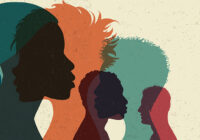A few weeks ago the Network Contagion Research Institute (NCRI) based at Rutgers University released a new study on the effectiveness of certain antiracist, anti-Islamophobic and caste-abolitionist DEI training programs.
It turned out that the training programs researchers examined — programs promoted by the likes of Ibram X. Kendi, Robin DeAngelo, the Institute for Social Policy and Understanding, and Equality Labs — not only failed to accomplish what they set out to do but actually made the situation worse.
In the words of the NCRI report authors:
The evidence presented in these studies reveals that while purporting to combat bias, some anti-oppressive DEI narratives can engender a hostile attribution bias and heighten racial suspicion, prejudicial attitudes, authoritarian policing, and support for punitive behaviors in the absence of evidence for a transgression deserving punishment.
In other words: The goal of these training programs is to reduce bigotry and hatred in the world, but they actually make bigotry and hatred worse, while at the same time increasing authoritarian inclinations in the population.
That’s a losing proposition for the intellectual and practical worth of critical theory on multiple fronts.
Looking specifically at the anti-caste training programs from Equality Labs — an organization I’ve had a great deal of professional interaction with working at the Hindu American Foundation, usually in the form of being called a “Hindu fascist” — the study showed that following exposure to Equality Labs’ “Unlearning Caste Supremacy” training materials individuals had “significantly higher perception of microaggressions, perceived harm, and assumptions of bias” and that the training programs “negatively influenced participants’ assumptions about Hindus’ racist attitudes” suggesting that “DEI content focused on caste discrimination can generate broader prejudices against the Hindu community broadly, including a false intuition that Hindus are racist.”
That’s rather not surprising considering that Equality Labs’ founder has proclaimed that “the real Nazis aren’t in Germany, they’re fucking upper caste Indians.”
Focusing on what divides us, either in the past or today, will never bring us together
One would think it obvious that hyper-focusing on social identity and seeing discrimination and oppression in all social interactions — to the point that even the smallest perceived slight gets labeled as aggression and words get equated with physical violence — will never create a society where each of us is judged by our individual character, behavior and circumstances, and not on our skin color or cultural ancestry.
What’s more, shouldn’t the proponents of DEI training programs such as those examined in this report be able to see that they themselves are behaving in the exact same way as those people they are purporting to fight against, simply with the tables turned?
Basically, antiracism is itself a racist philosophy; anti-casteism is actually a casteist philosophy.
How does such an approach create a less bigoted and more open society?
It intuitively won’t in theory. And now we have some more research showing that it doesn’t in practice either.
Mainstream media ignores the evidence; DEI proponents double down
Too bad, then, that apart from some Indian media outlets, center-right and heterodox news outlets in the US and heterodox writers, NCRI’s research was entirely ignored.
And at the same time, in what only seems to me a news-jacking double down, a number of opinion pieces were published attacking the stances my colleagues and I at the Hindu American Foundation (HAF) have taken on the best approach to addressing incidents of alleged caste discrimination in the US.
All misrepresented HAF’s true position on the issue: That the point of debate is not about whether there ought to be legal redress for discrimination based on caste, but what the best solution should be under the law; that existing legal categories are the best remedy, keeping with existing legal principles of facial neutrality; and, that establishing a new separate category for caste in discrimination law is more about making a political and ideological point than solving any problem of caste discrimination in the US.
For those coming late to this discussion, the best available data from the Carnegie Endowment for International Peace indicates caste discrimination in the US is exceedingly rare in comparison to other forms of social discrimination.
The insistence in the face of evidence of supporters of adding a separate category of caste to US discrimination law, by supporters of the critical theory approach to DEI training programs on caste, brings to mind Upton Sinclair’s remark that “It’s difficult to get a man to understand something when his salary,” or, in this case, political and social identity, too, “depends on his not understanding it.”
Since critical-theory-based antiracism and anti-casteism training programs are counterproductive, what is the solution?
I return to Hindu philosophy.
What is reiterated in so many key sources of knowledge within the tradition is that there is a shared Divine similarity running through all of us and that this shared Divinity is deserving of respect. Applying this, viewing each person I encounter as a reflection of that Divinity must be the starting point. All of us are worthy of respect and ought to be treated equally under our laws.
Similar teachings are present in all the Dharmic traditions, that is in Buddhism, Jainism, Sikhism, as well as the Hindu Dharma Traditions.
From this starting point, individual behavior and unreciprocated respect may cause me to respond differently, even antagonistically, to different people, as well as criticize those ideas that run counter to my ideals of respect and equal vision. And on a lesser level, each of us has our likes and dislikes culturally and stylistically that never amount to bigotry.
Such a reaction should not be cause for concern, nor does it run counter to the underlying principle that we are all part of a shared Divine whole.
We shouldn’t ignore our differences, past and present incidents of discrimination, nor look at how these have at times been institutionalized in our laws and policies.
Nevertheless though, when it comes to changing people’s hearts and minds, emphasizing what unites us, even at a deep metaphysical level, surely seems a more clear path to creating societies where each of us has similar opportunities to grow, to thrive, to express ourselves, than does obsessing at every opportunity about when individuals and societies have failed to live up to these ideals — and to foist off counterproductive yet profitable training programs teaching participants to emphasize our differences onto our schools and corporations.
The views expressed in this article are the author’s own and do not necessarily reflect Fair Observer’s editorial policy.
Support Fair Observer
We rely on your support for our independence, diversity and quality.
For more than 10 years, Fair Observer has been free, fair and independent. No billionaire owns us, no advertisers control us. We are a reader-supported nonprofit. Unlike many other publications, we keep our content free for readers regardless of where they live or whether they can afford to pay. We have no paywalls and no ads.
In the post-truth era of fake news, echo chambers and filter bubbles, we publish a plurality of perspectives from around the world. Anyone can publish with us, but everyone goes through a rigorous editorial process. So, you get fact-checked, well-reasoned content instead of noise.
We publish 2,500+ voices from 90+ countries. We also conduct education and training programs
on subjects ranging from digital media and journalism to writing and critical thinking. This
doesn’t come cheap. Servers, editors, trainers and web developers cost
money.
Please consider supporting us on a regular basis as a recurring donor or a
sustaining member.
Will you support FO’s journalism?
We rely on your support for our independence, diversity and quality.









Comment